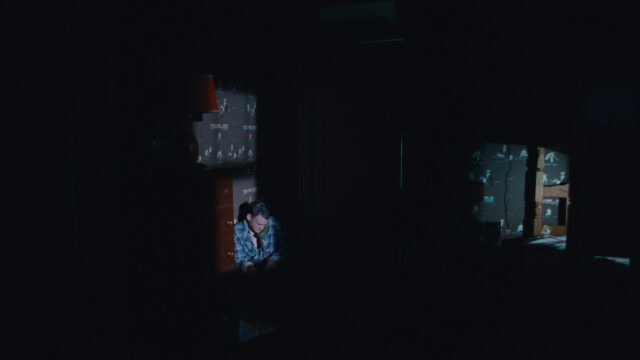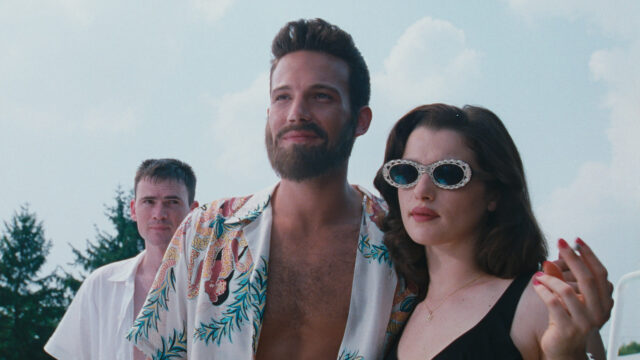
Willard “Sonny” Burns (Jeremy Davies) often finds himself in the dark in Going All the Way: The Director’s Edit
GOING ALL THE WAY: THE DIRECTOR’S EDIT (Mark Pellington, 1997/2022)
Quad Cinema
34 West 13th St. between Fifth & Sixth Aves.
Opens Friday, December 16
212-255-224
goingalltheway.oscilloscope.net
quadcinema.com
During the pandemic lockdown, filmmaker Mark Pellington found the original three-hour-plus cut of his 1997 debut, Going All the Way, a little-known, rarely shown coming-of-age tale with a fabulous young cast set in small-town Indianapolis in 1954. He and editor Leo Trombetta “were just bored in Covid,” so they decided to take another stab at the film, which had previously gone through several iterations nearly a quarter century ago, ranging from 98 to 112 to more than 180 minutes.
The project was mostly to just give them something to do, but soon they had trimmed the first 40 minutes, added 50 minutes of previously unused material and new, gentle voice-over narration by Trombetta, commissioned 50 minutes of new music from composer Pete Adams, and installed an ominous title sequence by Sergio Pinheiro that recalls David Lynch, with images of Main Street, rural America, Jesus, sexuality, and a bleeding razor. The result is a very different 126-minute film, darker, more introspective and character-driven, more attuned to Dan Wakefield’s 1970 bestselling autobiographical novel, which was adapted by the author himself. (Wakefield, who is now ninety, created the late-’70s television series James at 15 and appears as farmer #2 in Going All the Way.)
“I’ve always kinda been more of an outer-directed guy. Right?” Korean War veteran Tom “Gunner” Casselman (Ben Affleck) tells high school classmate Willard “Sonny” Burns (Jeremy Davies) at a bar. “And now, as time goes on, I’m kinda becoming more inner-directed, not giving a shit so much what the crowd thinks. You’ve always been kind of more of an inner-directed guy.” It’s a keen metaphor for the revised film.
Gunner is everybody’s all-American, a classically handsome high school sports star who came back from Korea with gleaming medals on his uniform. Sonny is the kid no one remembers, a wallflower who blends in with the background, a soldier and photographer who spent the war in public information in Kansas City. Gunner is a doer, while Sonny is a watcher, yet each of them wants to be more like the other, almost as if they are two sides of the same person, ego and id. In fact, the name of the high school paper that featured Sonny’s memorable picture of Gunner on the gridiron is named the Echo.

Sonny (Jeremy Davies) watches from behind as Gunner (Ben Affleck) and Marty (Rachel Weisz) stop by the club in Going All the Way
Both men live at home with their family. Gunner’s mother is a sexually attractive, outgoing divorcée who Gunner calls Nina (Lesley Ann Warren); the first time we see them together, it looks like they’re lovers. Sonny’s Bible-thumping mother, Alma (Jill Clayburgh), treats her boy like an innocent fawn unable to make his own decisions or know what’s best for him; Sonny’s father, Elwood (John Lordan), hardly ever speaks while always agreeing with his wife.
Gunner lives life minute to minute, ready to try just about anything since he was reawakened to so many possibilities during his time in Japan, especially if it involves women. When he is immediately taken by Marty Pilcher (Rachel Weisz), a Jewish woman interested in art and who wants to move to New York, Gunner goes with her to a museum, joined by Sonny, and Sonny’s sort-of girlfriend, Buddy Porter (Amy Locane), who is in love with him even though he gives her no reason to be. She has decided that she is going to marry him and start a family in her hometown, but Sonny is not so sure. He uses her, but she lives up to her name, being more of a friend (with benefits) who is willing to carry Sonny’s (heavy psychological) load.
When Gunner and Marty set up Sonny with the unfettered and liberated Gale Ann Thayer (Rose McGowan) at a fancy party, Sonny finally lets loose, but it comes with a price that makes him reconsider what path he wants to follow.
Filmed on location in Indianapolis in thirty days and now available in a 4K restoration opening December 16 at the Quad, Going All the Way: The Director’s Edit might have disappeared among the spate of 1990s coming-of-age movies (Dazed and Confused, Varsity Blues, This Boy’s Life, Rushmore), but it is now getting a much-deserved second chance in this reimagined update.
The cast is outstanding, with Affleck, in his first lead role, self-possessed and charming as Gunner, and Davies a bundle of uncomfortable nerves as Sonny, who often mutters unfinished sentences that can barely be heard. His constant jitteriness balances Affleck’s strong confidence. Cinematographer Bobby Bukowski often shoots Affleck with bright lighting, focusing on the upper half of his body, while Davies is often seen in darkness, shot from above to make him look small and insignificant. Clayburgh and Warren play two very different kinds of mothers who get to duke it out in one of the film’s best scenes. Rising stars Weisz, McGowan, Locane, and Nick Offerman (a bit part in his film debut) are a joy to watch.
Prior to Going All the Way, Pellington was primarily a director of music videos (U2, Public Enemy, Pearl Jam, Nine Inch Nails, Foo Fighters, Bruce Springsteen) and commercials. He has clearly learned a lot in the intervening years, helming such productions as Arlington Road, I Melt with You, and The Mothman Prophecies, and the new edit benefits from his experience, even if most of his films have not been met with critical acclaim. Going All the Way: The Director’s Edit also offers a lesson in how existing footage can be reconstructed into a more complex and intriguing narrative.
Pellington will be at the Quad for Q&As at the 7:00 show on Friday with Alex Ross Perry, 7:00 on Saturday with Bilge Ebiri, and 4:20 on Sunday with Dan Mecca.